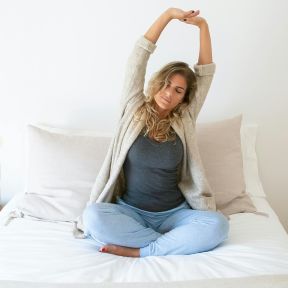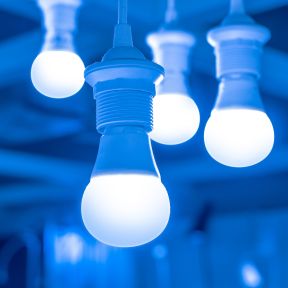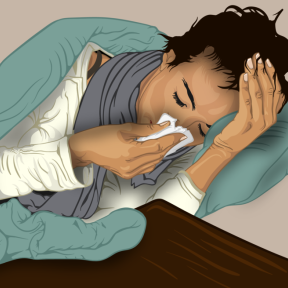
Circadian Rhythm
Circadian rhythms are the cycles that tell the body when to sleep, wake, and eat—the biological and psychological processes that oscillate in predictable patterns each day. This internal clock is influenced by external cues, like sunlight and temperature, which help determine whether one feels energized or exhausted at different times of the day.

Circadian rhythms are governed by a master clock, a group of neurons called the suprachiasmatic nucleus, located in a region of the brain called the hypothalamus. This master clock translates cues from the environment into directives for the body. For example, receptors in the eyes detect darkness and pass that signal along to the suprachiasmatic nucleus, which then stimulates the production of melatonin, the hormone that causes sleepiness.
Circadian rhythms have been critical throughout evolution, allowing animals to prepare for upcoming changes to their environment. Today, research is charting the harms of a disrupted circadian rhythm, such as sleep disorders, obesity, diabetes, depression, and bipolar disorder—not to mention difficulties concentrating and staying productive.
Due to frequent travel and shift work, many people today experience disturbances to their circadian clock. These disruptions can lead to difficulty sleeping, difficulty staying awake during the day, or clinical insomnia. More rarely, individuals may develop circadian rhythm disorders such as Delayed Sleep Phase Syndrome or Advanced Sleep Phase Disorder.
A chronotype refers to when someone tends to be most alert during the day. Some are morning larks and others are night owls. Although research on chronotypes is still evolving, one recent survey suggests that there may be distinct afternoon and napper chronotypes as well, when alertness peaks in the afternoon or before and after 3pm.
Older adults tend to have more trouble sleeping, including falling asleep, staying asleep, and remaining alert throughout the day. Research suggests that this may be because the brain area responsible for the circadian clock shows weaker electrical activity as we age, sending muffled messages to the rest of the body.

An individual's biological clock can be set earlier or later, but keeping cues that influence circadian rhythm steady can help everyone maintain their routine. Waking up and going to sleep at the same time each day—and exposing oneself to sunlight and darkness at those times—supports steady melatonin production. Avoiding screens in the evening is therefore an important change that can benefit those hoping for better sleep.
Sometimes these changes are outside of one's control, as in the case of travel. Jet lag occurs when the internal clock and external cues become misaligned, which can result in fatigue or irritability before the two forces realign.
Most people can reset their body clock by keeping a regular schedule and exposing themselves to natural light in the morning. But if you have Delayed Sleep Phase Disorder, you may want to explore melatonin, chronotherapy, or bright light therapy.
Decrease the brightness of screens at all times, and keep screens out of the bedroom altogether. Increase your exposure to sunlight and nature, incorporate more exercise into your day, and maintain a regular routine. These tips and others can offset the chance that screens disrupt your circadian rhythms.
The basics of sleep hygiene include creating a bedtime routine, making sure the bedroom is cool and dark, avoiding caffeine from the afternoon onward, and avoiding screens an hour before bed. It may also be helpful to take a 20 minute nap between 12pm and 3pm, and to focus on getting enough weekly sleep rather than nightly sleep.
When you wake up, get out of bed rather than snoozing the alarm and beginning a new sleep cycle. Provide your brain with fuel by eating breakfast. Go outside within two hours of waking up to expose yourself to natural light. Read a full hour-by-hour guide on how to best structure your day here.














